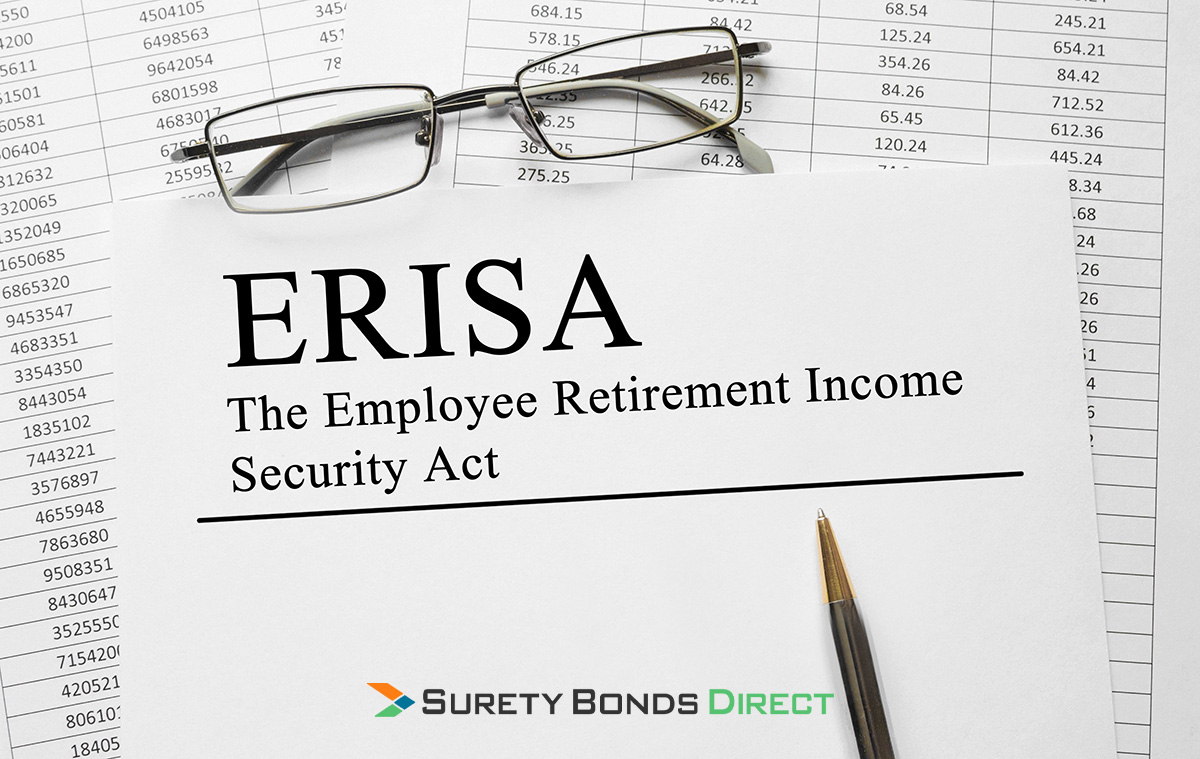Employee retirement plans are a cornerstone of many Americans' lives and futures. Thus, it’s crucial that the people who administer these plans be accountable for their decisions and conduct. ERISA surety bonds are some of the most important tools for ensuring the ethical administration of employee retirement plans.
ERISA bonds provide a binding financial guarantee that the plan’s administrators will obey all relevant laws and fulfill their fiduciary duty to the plan’s beneficiaries. In this brief guide, we’ll cover the essentials of ERISA bonds—what they are, who needs one, and how you can get one for an affordable premium.
What Is ERISA?
The Employment Retirement Income Security Act (ERISA) is a federal U.S. law enacted in 1974. This law regulates retirement and health plans in private industry and establishes standards to make them more secure.
One of ERISA’s most important requirements is that plan administrators with fiduciary duties obtain surety bonds. Since these plan administrators have substantial power over employees’ retirement funds, it’s crucial that employees be protected in the event that an administrator commits misconduct. An ERISA bond is a tool that’s intended to provide that protection.

ERISA Bond Basics
Watch our video explaining the ERISA bond requirements.
First, let’s talk about the definition of a surety bond. A surety bond is a type of three-party contract that provides a guarantee that one party (called the principal) will fulfill their obligation to another (called the obligee). A neutral third party, called the surety, provides the financial guarantee.
So, what is an ERISA bond? An ERISA bond is a type of surety bond that covers administrators and other fiduciaries of retirement plans regulated by ERISA. In this case, the fiduciary is the principal, and the plan and its beneficiaries are the obligees. ERISA surety bonds protect against acts of fraud and dishonesty by retirement plan fiduciaries, such as:
- Theft or misuse of plan funds
- Forgery of documents
- Assuming duties that create a conflict of interest
- Using their position as a fiduciary for personal profit
In the event of alleged misconduct by the fiduciary, the obligee may file a claim with the surety against the bond, which the fiduciary will be responsible for paying back.
An ERISA bond must have a coverage amount (known in surety bond terms as a penalty sum) equal to at least 10 percent of the plan assets that the fiduciary handles. In most cases, the minimum amount of coverage required is $1,000 and the maximum amount is $500,000. For plans that include employer-issued securities such as company stock, the maximum coverage amount is $1 million.

Do I Need an ERISA Bond?
If your responsibilities include any of the following, you probably need an ERISA bond:
- Negotiating or transferring retirement plan funds
- Signing checks or other negotiable instruments of a retirement plan
- Working with cash, physical documents, or other physical assets of a retirement plan
- Disbursing plan funds to beneficiaries
- Supervising or having control over any of the above
The following types of plans are generally exempt from ERISA oversight:
- Government pensions
- Plans established by religious organizations such as churches
- Plans that only cover applicable disability or workers’ compensation laws
- Plans maintained primarily outside the United States
If you need an ERISA bond, it can be relatively simple to get one—but there are some key facts to know to ensure that you work with a qualified surety and get an affordable rate.
How Much Does an ERISA Bond Cost?
The surety bond cost for most types of bonds is a percentage of the penalty sum. The percentage varies according to the principal’s credit score. However, most ERISA bonds don’t require a credit check.
ERISA surety bonds under $500,000 are available in three-year terms for a one-time flat premium determined by the penalty sum. A surety bond with a $50,000 penalty sum has a premium of $179, while a surety bond with a $500,000 penalty sum has a premium of $450. See Surety Bonds Direct’s full list of ERISA bond premiums to find out how much your surety bond will cost.
Bonds with coverage of about $500,000 do require a credit check. However, it’s still possible to get an ERISA surety bond with bad credit by adding a co-signer or using premium financing options.
How to Get an ERISA Bond
To get an ERISA bond, you’ll need to apply for one with a surety company, insurance company, or surety bond broker. Many people who need ERISA bonds find that surety bond brokers offer the best results, as they specialize in unique products like ERISA bonds and can compare bonds from hundreds of different sureties to find the perfect one for each principal.
A principal who needs an ERISA bond must apply to a surety approved by the Department of the Treasury’s (listed on Department Circular 570). You can get your bond instantly today through Surety Bonds Direct—just find your bond amount on our ERISA bonds page, and we’ll match you with a Treasury-approved surety. (If you need a bond with a coverage amount over $500,000, you’ll need to go through a quick credit check.)
Surety Bonds Direct offers affordable premiums on ERISA bonds in all 50 U.S. states. We offer free online surety bond quotes for ERISA bonds in just minutes—or call our surety bond professionals at 1-800-608-9950 to learn more.


